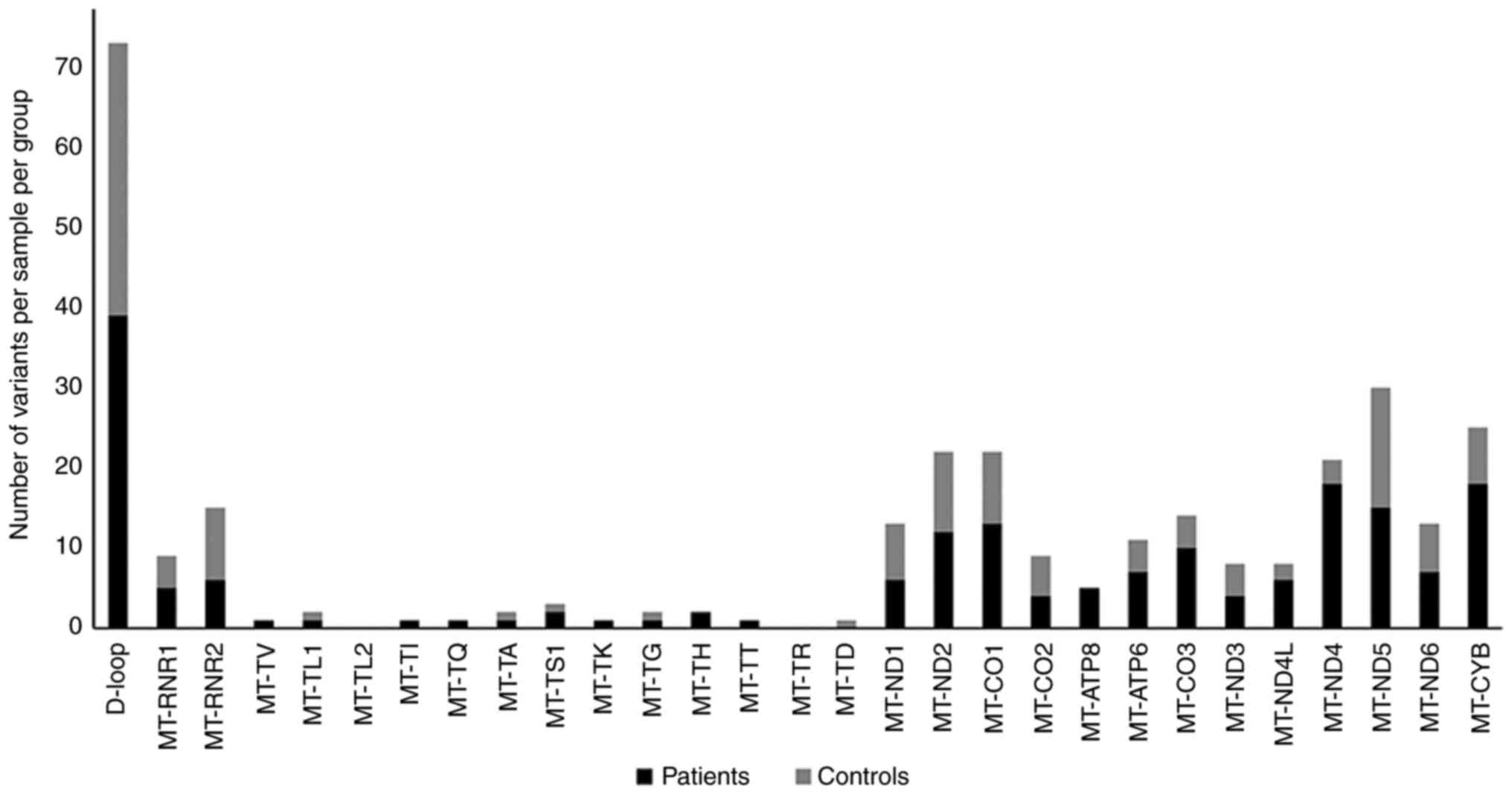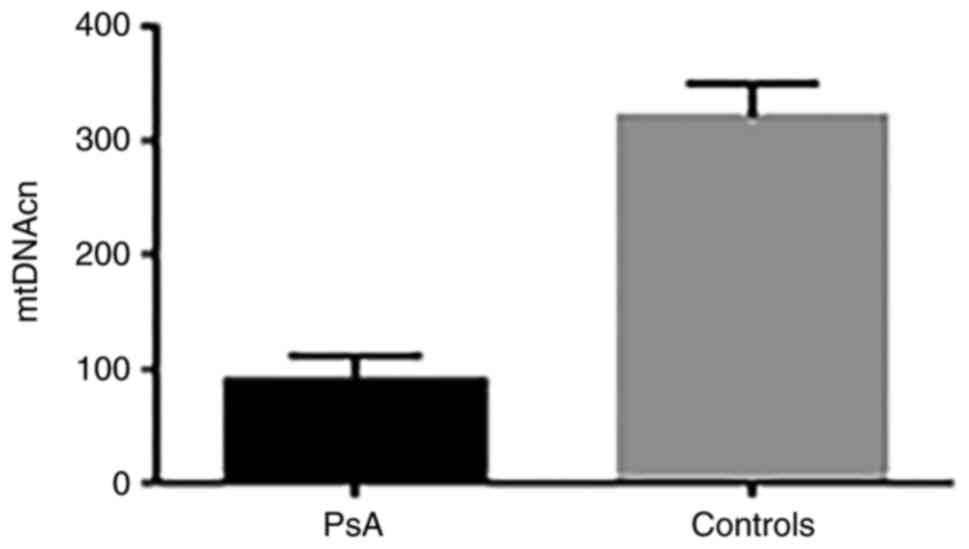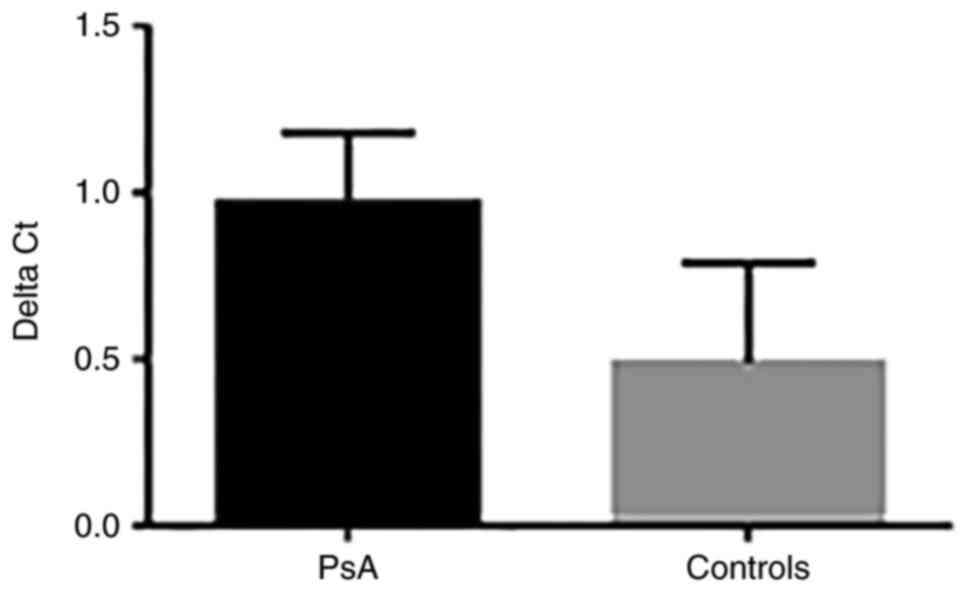|
1
|
Alinaghi F, Calov M, Kristensen LE,
Gladman DD, Coates LC, Jullien D, Gottlieb AB, Gisondi P, Wu JJ,
Thyssen JP and Egeberg A: Prevalence of psoriatic arthritis in
patients with psoriasis: A systematic review and meta-analysis of
observational and clinical studies. J Am Acad Dermatol. 80:251–265
e219. 2019.PubMed/NCBI View Article : Google Scholar
|
|
2
|
Ocampo DV and Gladman D: Psoriatic
arthritis. F1000Res. 8(F1000)2019.PubMed/NCBI View Article : Google Scholar
|
|
3
|
Karmacharya P, Chakradhar R and Ogdie A:
The epidemiology of psoriatic arthritis: A literature review. Best
Pract Res Clin Rheumatol. 35(101692)2021.PubMed/NCBI View Article : Google Scholar
|
|
4
|
Sukhov A, Adamopoulos IE and Maverakis E:
Interactions of the immune system with skin and bone tissue in
psoriatic arthritis: A comprehensive review. Clin Rev Allergy
Immunol. 51:87–99. 2016.PubMed/NCBI View Article : Google Scholar
|
|
5
|
Saalfeld W, Mixon AM, Zelie J and Lydon
EJ: Differentiating psoriatic arthritis from osteoarthritis and
rheumatoid arthritis: A narrative review and guide for advanced
practice providers. Rheumatol Ther. 8:1493–1517. 2021.PubMed/NCBI View Article : Google Scholar
|
|
6
|
Gladman DD, Mease PJ, Healy P, Helliwell
PS, Fitzgerald O, Cauli A, Lubrano E, Krueger GG, van der Heijde D,
Veale DJ, et al: Outcome measures in psoriatic arthritis. J
Rheumatol. 34:1159–1166. 2007.PubMed/NCBI
|
|
7
|
Carvalho AL and Hedrich CM: The molecular
pathophysiology of psoriatic arthritis-the complex interplay
between genetic predisposition, epigenetics factors, and the
microbiome. Front Mol Biosci. 8(662047)2021.PubMed/NCBI View Article : Google Scholar
|
|
8
|
Eder L, Haddad A, Rosen CF, Lee KA,
Chandran V, Cook R and Gladman DD: The incidence and risk factors
for psoriatic arthritis in patients with psoriasis: A prospective
cohort study. Arthritis Rheumatol. 68:915–923. 2016.PubMed/NCBI View Article : Google Scholar
|
|
9
|
Mizuguchi S, Gotoh K, Nakashima Y,
Setoyama D, Takata Y, Ohga S and Kang D: Mitochondrial reactive
oxygen species are essential for the development of psoriatic
inflammation. Front Immunol. 12(714897)2021.PubMed/NCBI View Article : Google Scholar
|
|
10
|
Therianou A, Vasiadi M, Delivanis DA,
Petrakopoulou T, Katsarou-Katsari A, Antoniou C, Stratigos A,
Tsilioni I, Katsambas A, Rigopoulos D and Theoharides TC:
Mitochondrial dysfunction in affected skin and increased
mitochondrial DNA in serum from patients with psoriasis. Exp
Dermatol. 28:72–75. 2019.PubMed/NCBI View Article : Google Scholar
|
|
11
|
Lin X and Huang T: Oxidative stress in
psoriasis and potential therapeutic use of antioxidants. Free Radic
Res. 50:585–595. 2016.PubMed/NCBI View Article : Google Scholar
|
|
12
|
Osellame LD, Blacker TS and Duchen MR:
Cellular and molecular mechanisms of mitochondrial function. Best
Pract Res Clin Endocrinol Metab. 26:711–723. 2012.PubMed/NCBI View Article : Google Scholar
|
|
13
|
Garcia I, Jones E, Ramos M,
Innis-Whitehouse W and Gilkerson R: The little big genome: The
organization of mitochondrial DNA. Front Biosci (Landmark Ed).
22:710–721. 2017.PubMed/NCBI View
Article : Google Scholar
|
|
14
|
Burr SP, Pezet M and Chinnery PF:
Mitochondrial DNA heteroplasmy and purifying selection in the
mammalian female germ line. Dev Growth Differ. 60:21–32.
2018.PubMed/NCBI View Article : Google Scholar
|
|
15
|
Montier LL, Deng JJ and Bai Y: Number
matters: Control of mammalian mitochondrial DNA copy number. J
Genet Genomics. 36:125–131. 2009.PubMed/NCBI View Article : Google Scholar
|
|
16
|
Bohr VA, Stevnsner T and de Souza-Pinto
NC: Mitochondrial DNA repair of oxidative damage in mammalian
cells. Gene. 286:127–134. 2002.PubMed/NCBI View Article : Google Scholar
|
|
17
|
Pagano G, Talamanca AA, Castello G,
Cordero MD, d'Ischia M, Gadaleta MN, Pallardó FV, Petrović S, Tiano
L and Zatterale A: Oxidative stress and mitochondrial dysfunction
across broad-ranging pathologies: Toward mitochondria-targeted
clinical strategies. Oxid Med Cell Longev.
2014(541230)2014.PubMed/NCBI View Article : Google Scholar
|
|
18
|
Liu CS, Tsai CS, Kuo CL, Chen HW, Lii CK,
Ma YS and Wei YH: Oxidative stress-related alteration of the copy
number of mitochondrial DNA in human leukocytes. Free Radic Res.
37:1307–1317. 2003.PubMed/NCBI View Article : Google Scholar
|
|
19
|
Taylor RW and Turnbull DM: Mitochondrial
DNA mutations in human disease. Nat Rev Genet. 6:389–402.
2005.PubMed/NCBI View Article : Google Scholar
|
|
20
|
Filograna R, Mennuni M, Alsina D and
Larsson NG: Mitochondrial DNA copy number in human disease: The
more the better? FEBS Lett. 595:976–1002. 2021.PubMed/NCBI View Article : Google Scholar
|
|
21
|
Harty LC, Biniecka M, O'Sullivan J, Fox E,
Mulhall K, Veale DJ and Fearon U: Mitochondrial mutagenesis
correlates with the local inflammatory environment in arthritis.
Ann Rheum Dis. 71:582–588. 2012.PubMed/NCBI View Article : Google Scholar
|
|
22
|
Zhang W, Cui H and Wong LJ: Comprehensive
one-step molecular analyses of mitochondrial genome by massively
parallel sequencing. Clin Chem. 58:1322–1331. 2012.PubMed/NCBI View Article : Google Scholar
|
|
23
|
Taylor W, Gladman D, Helliwell P,
Marchesoni A, Mease P and Mielants H: CASPAR Study Group.
Classification criteria for psoriatic arthritis: Development of new
criteria from a large international study. Arthritis Rheum.
54:2665–2673. 2006.PubMed/NCBI View Article : Google Scholar
|
|
24
|
Alwehaidah MS, AlFadhli S and Al-Kafaji G:
Leukocyte mitochondrial DNA copy number is a potential non-invasive
biomarker for psoriasis. PLoS One. 17(e0270714)2022.PubMed/NCBI View Article : Google Scholar
|
|
25
|
Alwehaidah MS, Al-Kafaji G, Bakhiet M and
Alfadhli S: Next-generation sequencing of the whole mitochondrial
genome identifies novel and common variants in patients with
psoriasis, type 2 diabetes mellitus and psoriasis with comorbid
type 2 diabetes mellitus. Biomed Rep. 14(41)2021.PubMed/NCBI View Article : Google Scholar
|
|
26
|
Bandelt HJ, Kloss-Brandstatter A, Richards
MB, Yao YG and Logan I: The case for the continuing use of the
revised Cambridge reference sequence (rCRS) and the standardization
of notation in human mitochondrial DNA studies. J Hum Genet.
59:66–77. 2014.PubMed/NCBI View Article : Google Scholar
|
|
27
|
Dong C, Wei P, Jian X, Gibbs R, Boerwinkle
E, Wang K and Liu X: Comparison and integration of deleteriousness
prediction methods for nonsynonymous SNVs in whole exome sequencing
studies. Hum Mol Genet. 24:2125–2137. 2015.PubMed/NCBI View Article : Google Scholar
|
|
28
|
Gonzalez-Perez A and Lopez-Bigas N:
Improving the assessment of the outcome of nonsynonymous SNVs with
a consensus deleteriousness score, Condel. Am J Hum Genet.
88:440–449. 2011.PubMed/NCBI View Article : Google Scholar
|
|
29
|
Choi Y and Chan AP: PROVEAN web server: A
tool to predict the functional effect of amino acid substitutions
and indels. Bioinformatics. 31:2745–2747. 2015.PubMed/NCBI View Article : Google Scholar
|
|
30
|
Pandurangan AP, Ochoa-Montano B, Ascher DB
and Blundell TL: SDM: A server for predicting effects of mutations
on protein stability. Nucleic Acids Res. 45:W229–W235.
2017.PubMed/NCBI View Article : Google Scholar
|
|
31
|
Livak KJ and Schmittgen TD: Analysis of
relative gene expression data using real-time quantitative PCR and
the 2(-Delta Delta C(T)) method. Methods. 25:402–408.
2001.PubMed/NCBI View Article : Google Scholar
|
|
32
|
Lin PH, Lee SH, Su CP and Wei YH:
Oxidative damage to mitochondrial DNA in atrial muscle of patients
with atrial fibrillation. Free Radic Biol Med. 35:1310–1318.
2003.PubMed/NCBI View Article : Google Scholar
|
|
33
|
Movassaghi S, Jafari S, Falahati K, Ataei
M, Sanati MH and Jadali Z: Quantification of mitochondrial DNA
damage and copy number in circulating blood of patients with
systemic sclerosis by a qPCR-based assay. An Bras Dermatol.
95:314–319. 2020.PubMed/NCBI View Article : Google Scholar
|
|
34
|
Suissa S, Wang Z, Poole J, Wittkopp S,
Feder J, Shutt TE, Wallace DC, Shadel GS and Mishmar D: Ancient
mtDNA genetic variants modulate mtDNA transcription and
replication. PLoS Genet. 5(e1000474)2009.PubMed/NCBI View Article : Google Scholar
|
|
35
|
Fan W, Waymire KG, Narula N, Li P, Rocher
C, Coskun PE, Vannan MA, Narula J, Macgregor GR and Wallace DCA:
mouse model of mitochondrial disease reveals germline selection
against severe mtDNA mutations. Science. 319:958–962.
2008.PubMed/NCBI View Article : Google Scholar
|
|
36
|
Komar AA: Genetics. SNPs, silent but not
invisible. Science. 315:466–467. 2007.PubMed/NCBI View Article : Google Scholar
|
|
37
|
Shabalina SA, Spiridonov NA and Kashina A:
Sounds of silence: Synonymous nucleotides as a key to biological
regulation and complexity. Nucleic Acids Res. 41:2073–2094.
2013.PubMed/NCBI View Article : Google Scholar
|
|
38
|
Kimchi-Sarfaty C, Oh JM, Kim IW, Sauna ZE,
Calcagno AM, Ambudkar SV and Gottesman MM: A ‘silent’ polymorphism
in the MDR1 gene changes substrate specificity. Science.
315:525–528. 2007.PubMed/NCBI View Article : Google Scholar
|
|
39
|
Du J, Yu S, Wang D, Chen S, Chen S, Zheng
Y, Wang N, Chen S, Li J and Shen B: Germline and somatic mtDNA
mutation spectrum of rheumatoid arthritis patients in the Taizhou
area, China. Rheumatology (Oxford). 59:2982–2991. 2020.PubMed/NCBI View Article : Google Scholar
|
|
40
|
Schaefer C and Rost B: Predict impact of
single amino acid change upon protein structure. BMC Genomics. 13
(Suppl 4)(S4)2012.PubMed/NCBI View Article : Google Scholar
|
|
41
|
Kauzmann W: Some factors in the
interpretation of protein denaturation. Adv Protein Chem. 14:1–63.
1959.PubMed/NCBI View Article : Google Scholar
|
|
42
|
Aznauryan M, Nettels D, Holla A, Hofmann H
and Schuler B: Single-molecule spectroscopy of cold denaturation
and the temperature-induced collapse of unfolded proteins. J Am
Chem Soc. 135:14040–14043. 2013.PubMed/NCBI View Article : Google Scholar
|
|
43
|
Karamitros CS, Murray K, Winemiller B,
Lamb C, Stone EM, D'Arcy S, Johnson KA and Georgiou G: Leveraging
intrinsic flexibility to engineer enhanced enzyme catalytic
activity. Proc Natl Acad Sci USA. 119(e2118979119)2022.PubMed/NCBI View Article : Google Scholar
|
|
44
|
Counago R, Wilson CJ, Pena MI,
Wittung-Stafshede P and Shamoo Y: An adaptive mutation in adenylate
kinase that increases organismal fitness is linked to
stability-activity trade-offs. Protein Eng Des Sel. 21:19–27.
2008.PubMed/NCBI View Article : Google Scholar
|
|
45
|
Jaenicke R: Protein stability and
molecular adaptation to extreme conditions. Eur J Biochem.
202:715–728. 1991.PubMed/NCBI View Article : Google Scholar
|
|
46
|
DePristo MA, Weinreich DM and Hartl DL:
Missense meanderings in sequence space: A biophysical view of
protein evolution. Nat Rev Genet. 6:678–687. 2005.PubMed/NCBI View Article : Google Scholar
|
|
47
|
Bjorklund P, Lindberg D, Akerstrom G and
Westin G: Stabilizing mutation of CTNNB1/beta-catenin and protein
accumulation analyzed in a large series of parathyroid tumors of
Swedish patients. Mol Cancer. 7(53)2008.PubMed/NCBI View Article : Google Scholar
|
|
48
|
Song W, Patel A, Qureshi HY, Han D,
Schipper HM and Paudel HK: The Parkinson disease-associated A30P
mutation stabilizes alpha-synuclein against proteasomal degradation
triggered by heme oxygenase-1 over-expression in human
neuroblastoma cells. J Neurochem. 110:719–733. 2009.PubMed/NCBI View Article : Google Scholar
|
|
49
|
Hirst J, King MS and Pryde KR: The
production of reactive oxygen species by complex I. Biochem Soc
Trans. 36:976–980. 2008.PubMed/NCBI View Article : Google Scholar
|
|
50
|
Murphy MP: How mitochondria produce
reactive oxygen species. Biochem J. 417:1–13. 2009.PubMed/NCBI View Article : Google Scholar
|
|
51
|
Malfatti E, Bugiani M, Invernizzi F, de
Souza CF, Farina L, Carrara F, Lamantea E, Antozzi C, Confalonieri
P, Sanseverino MT, et al: Novel mutations of ND genes in complex I
deficiency associated with mitochondrial encephalopathy. Brain.
130:1894–1904. 2007.PubMed/NCBI View Article : Google Scholar
|
|
52
|
Rodenburg RJ: Mitochondrial complex
I-linked disease. Biochim Biophys Acta. 1857:938–945.
2016.PubMed/NCBI View Article : Google Scholar
|
|
53
|
Hofhaus G and Attardi G: Lack of assembly
of mitochondrial DNA-encoded subunits of respiratory NADH
dehydrogenase and loss of enzyme activity in a human cell mutant
lacking the mitochondrial ND4 gene product. EMBO J. 12:3043–3048.
1993.PubMed/NCBI View Article : Google Scholar
|
|
54
|
Bai Y and Attardi G: The mtDNA-encoded ND6
subunit of mitochondrial NADH dehydrogenase is essential for the
assembly of the membrane arm and the respiratory function of the
enzyme. EMBO J. 17:4848–4858. 1998.PubMed/NCBI View Article : Google Scholar
|
|
55
|
Bai Y, Hu P, Park JS, Deng JH, Song X,
Chomyn A, Yagi T and Attardi G: Genetic and functional analysis of
mitochondrial DNA-encoded complex I genes. Ann N Y Acad Sci.
1011:272–283. 2004.PubMed/NCBI View Article : Google Scholar
|
|
56
|
Muller FL, Liu Y and Van Remmen H: Complex
III releases superoxide to both sides of the inner mitochondrial
membrane. J Biol Chem. 279:49064–49073. 2004.PubMed/NCBI View Article : Google Scholar
|
|
57
|
Bleier L and Drose S: Superoxide
generation by complex III: From mechanistic rationales to
functional consequences. Biochim Biophys Acta. 1827:1320–1331.
2013.PubMed/NCBI View Article : Google Scholar
|
|
58
|
Keightley JA, Anitori R, Burton MD, Quan
F, Buist NR and Kennaway NG: Mitochondrial encephalomyopathy and
complex III deficiency associated with a stop-codon mutation in the
cytochrome b gene. Am J Hum Genet. 67:1400–1410. 2000.PubMed/NCBI View Article : Google Scholar
|
|
59
|
Carossa V, Ghelli A, Tropeano CV,
Valentino ML, Iommarini L, Maresca A, Caporali L, La Morgia C,
Liguori R, Barboni P, et al: A novel in-frame 18-bp microdeletion
in MT-CYB causes a multisystem disorder with prominent exercise
intolerance. Hum Mutat. 35:954–958. 2014.PubMed/NCBI View Article : Google Scholar
|
|
60
|
Emmanuele V, Sotiriou E, Rios PG, Ganesh
J, Ichord R, Foley AR, Akman HO and Dimauro S: A novel mutation in
the mitochondrial DNA cytochrome b gene (MTCYB) in a patient with
mitochondrial encephalomyopathy, lactic acidosis, and strokelike
episodes syndrome. J Child Neurol. 28:236–242. 2013.PubMed/NCBI View Article : Google Scholar
|
|
61
|
Amaral-Fernandes MS, Marcondes AM, do Amor
Divino Miranda PM, Maciel-Guerra AT and Sartorato EL: Mutations for
Leber hereditary optic neuropathy in patients with alcohol and
tobacco optic neuropathy. Mol Vis. 17:3175–3179. 2011.PubMed/NCBI
|
|
62
|
Li Y, Park JS, Deng JH and Bai Y:
Cytochrome c oxidase subunit IV is essential for assembly and
respiratory function of the enzyme complex. J Bioenerg Biomembr.
38:283–291. 2006.PubMed/NCBI View Article : Google Scholar
|
|
63
|
Jonckheere AI, Smeitink JA and Rodenburg
RJ: Mitochondrial ATP synthase: Architecture, function and
pathology. J Inherit Metab Dis. 35:211–225. 2012.PubMed/NCBI View Article : Google Scholar
|
|
64
|
Dautant A, Meier T, Hahn A,
Tribouillard-Tanvier D, di Rago JP and Kucharczyk R: ATP synthase
diseases of mitochondrial genetic origin. Front Physiol.
9(329)2018.PubMed/NCBI View Article : Google Scholar
|
|
65
|
Coto-Segura P, Santos-Juanes J, Gomez J,
Alvarez V, Díaz M, Alonso B, Corao AI and Coto E: Common European
mitochondrial haplogroups in the risk for psoriasis and psoriatic
arthritis. Genet Test Mol Biomarkers. 16:621–623. 2012.PubMed/NCBI View Article : Google Scholar
|
|
66
|
Gomes TM, Ng YS, Pickett SJ, Turnbull DM
and Vincent AE: Mitochondrial DNA disorders: From pathogenic
variants to preventing transmission. Hum Mol Genet. 30:R245–R253.
2021.PubMed/NCBI View Article : Google Scholar
|
|
67
|
Negishi Y, Hattori A, Takeshita E, Sakai
C, Ando N, Ito T, Goto Y and Saitoh S: Homoplasmy of a
mitochondrial 3697G>A mutation causes Leigh syndrome. J Hum
Genet. 59:405–407. 2014.PubMed/NCBI View Article : Google Scholar
|
|
68
|
Al-Kafaji G, Alharbi MA, Alkandari H,
Salem AH and Bakhiet M: Analysis of the entire mitochondrial genome
reveals Leber's hereditary optic neuropathy mitochondrial DNA
mutations in an Arab cohort with multiple sclerosis. Sci Rep.
12(11099)2022.PubMed/NCBI View Article : Google Scholar
|
|
69
|
Crispim D, Estivalet AAF, Roisenberg I,
Gross JL and Canani LH: Prevalence of 15 mitochondrial DNA
mutations among type 2 diabetic patients with or without clinical
characteristics of maternally inherited diabetes and deafness. Arq
Bras Endocrinol Metabol. 52:1228–1235. 2008.PubMed/NCBI View Article : Google Scholar
|
|
70
|
Keogh MJ and Chinnery PF: Mitochondrial
DNA mutations in neurodegeneration. Biochim Biophys Acta.
1847:1401–1411. 2015.PubMed/NCBI View Article : Google Scholar
|
|
71
|
Zhan D, Tanavalee A, Tantavisut S,
Ngarmukos S, Edwards SW and Honsawek S: Relationships between blood
leukocyte mitochondrial DNA copy number and inflammatory cytokines
in knee osteoarthritis. J Zhejiang Univ Sci B. 21:42–52.
2020.PubMed/NCBI View Article : Google Scholar
|
|
72
|
Al-Kafaji G, Bakheit HF, Alharbi MA,
Farahat AA, Jailani M, Ebrahin BH and Bakhiet M: Mitochondrial DNA
copy number in peripheral blood as a potential non-invasive
biomarker for multiple sclerosis. Neuromolecular Med. 22:304–313.
2020.PubMed/NCBI View Article : Google Scholar
|

















